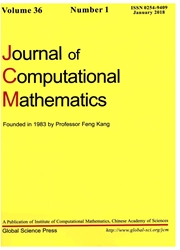

 中文摘要:
中文摘要:
We study the numerical behaviours of the relaxed asynchronous multisplitting methods for the linear complementarity problems by solving some typical problems from practical applications on a real multiprocessor system. Numerical results show that the parallel multisplitting relaxation methods always perform much better than the corresponding sequential alternatives, and that the asynchronous multisplitting relaxation methods often outperform their corresponding synchronous counterparts. Moreover, the two-sweep relaxed multisplitting methods have better convergence properties than their corresponding one-sweep relaxed ones in the sense that they have larger convergence domains and faster convergence speeds. Hence, the asynchronous multisplitting unsymmetric relaxation iterations should be the methods of choice for solving the large sparse linear complementarity problems in the parallel computing environments.
 英文摘要:
英文摘要:
Presents a study of the numerical behaviors of the relaxed asynchronous multisplitting methods for linear complementarity problems by solving typical problems from practical applications on a real multiprocessor system. Description of the tested problems and computing environment used in the computations; Description of the asynchronous multisplitting unsymmetric accelerated overrelaxation method; Discussion of results.
 同期刊论文项目
同期刊论文项目
 同项目期刊论文
同项目期刊论文
 期刊信息
期刊信息
